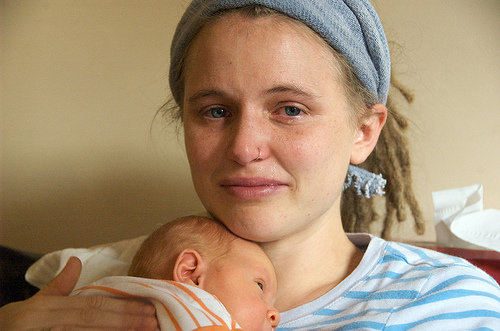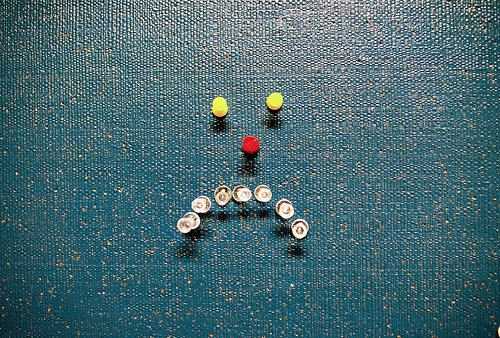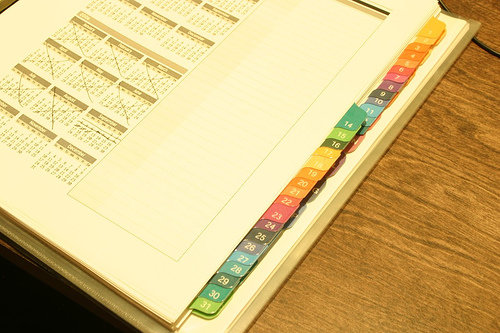

Postpartum depression....what can I say about it? Having been there myself in the past, I understand how difficult it can be to deal with it and how easy to let it rule your life. Yes, professional help is a must but the first step in conquering any form of depression is knowing it inside out and here are 7 things you need to know about postpartum depression...
 Postpartum depression does not have one single cause to it. Emotional, physical and lifestyle factors could all play an equal and real role. I have also found that depression runs in some families. Has someone in your family suffered from this depression in the past?
Postpartum depression does not have one single cause to it. Emotional, physical and lifestyle factors could all play an equal and real role. I have also found that depression runs in some families. Has someone in your family suffered from this depression in the past?
Photo Credit: kellyandapril
 Any woman who is pregnant, recently weaned a child, adopted a child or has had a baby in the past couple of months can get this type of depression. A woman could experience this regardless of her age and the number of children she has had in the past. Oddly enough, I read somewhere that men can get this too.
Any woman who is pregnant, recently weaned a child, adopted a child or has had a baby in the past couple of months can get this type of depression. A woman could experience this regardless of her age and the number of children she has had in the past. Oddly enough, I read somewhere that men can get this too.
Photo Credit: Ryan Brenizer
 Yes, there is a treatment. Postpartum depression is treated a lot like the other types of depression. Medications, counseling and support can help. So don't hesitate to ask for help. Your doctor knows best.
Yes, there is a treatment. Postpartum depression is treated a lot like the other types of depression. Medications, counseling and support can help. So don't hesitate to ask for help. Your doctor knows best.
Photo Credit: bıtzı
 Many refer to this type of depression as the 'baby blues'. It happens in about half of the women that give birth. If you have the baby blues, then I repeat that you need to seek help from someone rather than wait for it to pass or miraculously disappear.
Many refer to this type of depression as the 'baby blues'. It happens in about half of the women that give birth. If you have the baby blues, then I repeat that you need to seek help from someone rather than wait for it to pass or miraculously disappear.
Photo Credit: Christine Lebrasseur
 Postpartum depression can last from a couple of days to a couple of weeks to a couple of months. It can start to show anywhere from three to five days after you have delivered a child. In my next post, I will tell you how to fight postpartum depression, so if you or someone you know has it, please read it.
Postpartum depression can last from a couple of days to a couple of weeks to a couple of months. It can start to show anywhere from three to five days after you have delivered a child. In my next post, I will tell you how to fight postpartum depression, so if you or someone you know has it, please read it.
Photo Credit: webbr
 When a woman is dealing with this form of depression, they can cry more easily than usual. They may also have trouble sleeping. You may also feel sad, irritable and on edge. You will be dealing with a lot of emotions.
When a woman is dealing with this form of depression, they can cry more easily than usual. They may also have trouble sleeping. You may also feel sad, irritable and on edge. You will be dealing with a lot of emotions.
Photo Credit: Arual (Laura Cammarata)
 Did you know that baby blues are so common that they are not thought of as being an illness? If you think about it, we are sure you know someone who had to deal with this type of depression. It is a lot more common than people like to think. So you're not alone and help is not far away.
Did you know that baby blues are so common that they are not thought of as being an illness? If you think about it, we are sure you know someone who had to deal with this type of depression. It is a lot more common than people like to think. So you're not alone and help is not far away.
Photo Credit: lynne_b
First of all, it is important that you learn how to chill out. If you are a new mother, then I would like to tell you a fact that I read in a magazine. Studies have shown that newborn babies bond better with their mother when they are calm. You should spend at least fifteen minutes each day relaxing.
Exercise may not sound so fun to you right now, but you should do it! Stop saying you will and just set a time aside to exercise and do it. Exercise will get your blood flowing and will help you feel better. I have noticed that exercise does make me feel better. Are you with me on this one?
Contrary to belief, I have to add that postpartum depression does not interfere with a mother’s ability to care for the baby. This is not something that is related to a mental illness and is not caused by any type of stress though stress and a long history of depression can influence it.
Have you dealt with postpartum depression before? Would you mind sharing your story with me so that our readers can get a better idea about it?